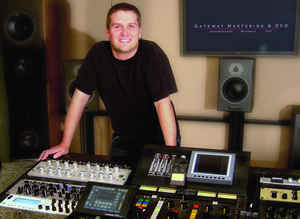I have been mastering records now at Gateway Mastering for over 15 years, and have had the pleasure of working with a diverse range of clients, from indie artists recording in their bedrooms and rehearsal spaces, to some of the most world famous artists working with the best record producers and engineers in world class recording facilities. Over the years I have always kept an open line of communication with all of my clients, and for this blog post I’ve put together a list of 5 of the most commonly asked questions about mastering, with my answers of course.
1) Should I use buss compression on my mix? If so, should I turn it off before mastering?
Buss Compression is OK!
I have no issues with buss compression on a mix, and in fact, it is often needed. Compression is such an integral part of mixing, and if you avoid it you may be doing your mix a disservice. I do not agree with the notion that a mix should be sent to mastering without any compression – especially if you like what your compression does for your mix.
Now, here’s where you can run into trouble – too much compression (of course). But, where is the line? My feeling is that if you are using compression or limiting in a mix for glue, feel, and musicality you are often going to be OK. Once you cross into using compression or limiting solely for level and loudness you my have crossed the line (but not always!), making it difficult for your mastering engineer to work with your mixes.
My advice is always this – if you are unsure of how much compression is too much, then print a few versions for your mastering engineer to choose from. Maybe one with all the compression that you like, one dialed back a bit, and maybe even one with no compression at all, just in case. For the one with no compression you must really be careful and be sure that turning the compressor off does not change the entire complexion of your mix.
This also goes for buss EQ. If you like it, use it!
2) I’ve been making loud listening refs throughout the mixing process, should I send those to mastering?
Your mastering engineer absolutely wants to hear your listening refs.
It’s very common today for a mix engineer to print both a final/master mix, and a limited/ quasi-mastered louder version for the clients’ listening refs. I totally get why this is done – often a client likes to hear a mix at or approaching the loudness of a final master, and finds it hard to make critical mix decisions and approvals on less loud mixes.
Always be sure to send those listening refs to your mastering engineer, as an example of what everyone involved in the record has been listening to. This is really important.
Be warned – if the listening refs are overcooked (slammed, over-compressed, hyper loud), the client may get used to how that sounds, and force your mastering engineer into a really loud corner. So, always be careful with how hot you make them!
3) What level should I print my mixes at? Should I be paying attention to RMS (average) or dBfs (peak) levels?
My advice to any mix engineer is to print their mix with peaks as close to 0 dBfs as they’d like, without going over. This does not mean to introduce extra compression or limiting to do so, just simply feel free to print as close to 0 as you’ d like. Some mixers prefer somewhere between -2 dBfs and -6 dBfs, and I think that works just as well. Anything below -6 dBfs feels like a waste of resolution IMHO. That said, at 24 and 32 bit digital you are not losing much!
As for RMS values – I feel it’s a dangerous thing to aim for a specific RMS value for any mix, or master for that matter. Average and perceived loudness truly varies from recording to recording and mix to mix. Once we start trying to place every mix into the same spot in terms of RMS I feel we start to make sacrifices for level. So, compress and limit to taste (see question #1!) and stop before diminishing returns.
4) Should I send stems to mastering?
Stem mastering is not my bag.
I am often asked about stem mastering, and my reply is always the same – I’d much prefer a completed stereo mix. In fact, I’m asked about stem mastering so often that I have to assume that there are mastering engineers out there that prefer to master from stems, but I have yet to meet any that do!
I have certainly mastered from stems before, and surely will again at some point (maybe even tomorrow!), but stems are usually the exception, not the rule. Stems might be used
for last minute heroics – to save the day and fix a mix issue. This is where they shine. But to default to stem mastering usually means you are defaulting to kicking mix decisions down the road, and turning the mastering session into a final mix session.
5) Should I talk to my mastering engineer ahead of time?
Communication is key.
I’ve found over many years of mastering that not only are my critical listening skills super important, but also my ability to listen well to what my clients are saying or asking for. I always keep an open line of communication and encourage every client to do so as well. At times this might be as simple as an email relaying any pertinent info, or a quick phone call if necessary. Sometimes it’s just “hey, just do your thing”, and sometimes it is some very important and specific details. The point is, never hesitate to communicate!
Adam Ayan
www.adamayan.com
www.facebook.com/adamayan
